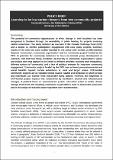Files in this item
POLICY BRIEF Learning to be low-carbon : lessons from two community projects
Item metadata
| dc.contributor.author | Meyerricks, Svenja | |
| dc.contributor.author | Bebbington, Jan | |
| dc.contributor.author | White, Rehema Mary | |
| dc.date.accessioned | 2016-08-02T16:30:08Z | |
| dc.date.available | 2016-08-02T16:30:08Z | |
| dc.date.issued | 2016-02-01 | |
| dc.identifier | 244696796 | |
| dc.identifier | 88af6cdb-58dd-4d9d-a14d-f57f3827ff54 | |
| dc.identifier.citation | Meyerricks , S , Bebbington , J & White , R M 2016 , POLICY BRIEF Learning to be low-carbon : lessons from two community projects . University of St Andrews . | en |
| dc.identifier.other | ORCID: /0000-0002-9669-0012/work/64697339 | |
| dc.identifier.uri | https://hdl.handle.net/10023/9246 | |
| dc.description.abstract | The potential of community organisations to effect change in their localities has been recognised in Scotland through the availability of public funding for projects involving carbon reductions. This study included an overview of the Climate Challenge Fund (CCF) and a deeper 11 months participative engagement with case study projects. Summary results of the main two case studies reported in this policy brief include 1) differentiation between 'community', 'community organisation' and the 'community project' funded by the CCF; 2) potential for community initiatives to focus on internal group development or outreach, with both foci being beneficial; 3) diversity in community organisations' values and project aims that appears to be linked to different priorities resulting from inequalities, different notions of 'community' and a lack of political avenues for long-term community engagement. Community projects funded by the CCF have achieved pro-environmental and social benefits beyond carbon reductions, at local and larger scales. CCF-funded community projects act as valuable liminal spaces (spatial and temporal) in which groups and individuals can explore more sustainable living options. However, the magnitude of CCF-funded project impacts was constrained by insufficient societal and infrastructural changes. A political focus on environmental justice, intensified action to tackle climate change at all levels and involving community organisations more in democratic processes and in the design of research concerning them were recommended. | |
| dc.format.extent | 6 | |
| dc.format.extent | 821422 | |
| dc.language.iso | eng | |
| dc.publisher | University of St Andrews | |
| dc.subject | HD28 Management. Industrial Management | en |
| dc.subject | QC Physics | en |
| dc.subject | SDG 13 - Climate Action | en |
| dc.subject.lcc | HD28 | en |
| dc.subject.lcc | QC | en |
| dc.title | POLICY BRIEF Learning to be low-carbon : lessons from two community projects | en |
| dc.type | Report | en |
| dc.contributor.sponsor | Economic & Social Research Council | en |
| dc.contributor.institution | University of St Andrews. School of Management | en |
| dc.contributor.institution | University of St Andrews. St Andrews Sustainability Institute | en |
| dc.contributor.institution | University of St Andrews. Geography & Sustainable Development | en |
| dc.contributor.institution | University of St Andrews. Scottish Oceans Institute | en |
| dc.identifier.grantnumber | RES-809-19-0021 | en |
This item appears in the following Collection(s)
Items in the St Andrews Research Repository are protected by copyright, with all rights reserved, unless otherwise indicated.

